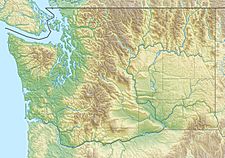Kennedy Glacier (Washington) facts for kids
Quick facts for kids Kennedy Glacier |
|
|---|---|
| Type | Mountain glacier |
| Coordinates | 48°07′30″N 121°07′22″W / 48.12500°N 121.12278°W |
| Length | 1.5 mi (2.4 km) |
| Terminus | Icefall |
| Status | Retreating |
Kennedy Glacier is a large mass of ice located on the northwest side of Glacier Peak in Washington, USA. Like many glaciers around the world, Kennedy Glacier is currently getting smaller. This process is called "retreating," and it means the glacier is melting faster than new snow can build up.
Where is Kennedy Glacier?
Kennedy Glacier is found high up on the slopes of Glacier Peak. This mountain is in Snohomish County, which is part of Washington state. It's an icy and beautiful area within the Cascade Range.
How Glaciers Change Over Time
Glaciers are like very slow-moving rivers made of ice. They grow when a lot of snow falls and stays frozen, adding to their size. They shrink, or "retreat," when more ice melts away than new snow can build up. This balance between snow and melt can change over time due to climate.
The Little Ice Age
Long ago, from about the 1300s to the mid-1800s, there was a period called the Little Ice Age. During this cooler time, Kennedy Glacier grew much larger. It stretched down to an elevation of about 4,314 ft (1,315 m). At its biggest, it was even connected to another glacier called Scimitar Glacier to its south.
Recent Changes
After the Little Ice Age, the climate began to warm. From about 1850 to 1952, Kennedy Glacier lost a lot of its length, shrinking by about 5,577 ft (1,700 m).
However, there was a short period from 1952 to 1984 that was cooler and wetter. During these years, the glacier actually grew a bit, advancing by about 1,050 ft (320 m). But this growth didn't last long. Between 1984 and 2005, the glacier started retreating again, losing about 1,450 ft (440 m) of its length. Scientists continue to watch Kennedy Glacier to understand how it changes with the climate.


